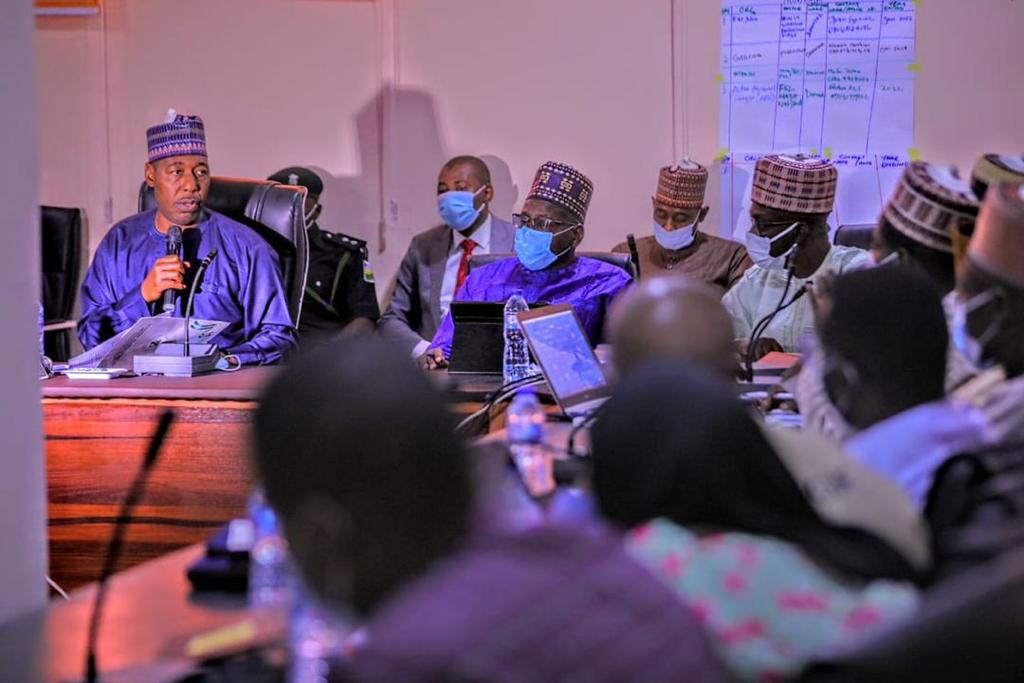Borno State Governor, Babagana Umara Zulum yesterday met with international and local non-Governmental Organisations, as well as the civil societies, during which he explained the state’s decision for closure of Internally Displaced Persons’ camps and the restrictions placed on food aide in resettled communities.
The meeting came at a time Zulum just released a lot of money, distributed to 115,000 safely resettled IDPs in 11 communities.
Amongst them, included households made up of a husband, wife, and some children, andwere given N200,000, while widows were given N150,000 each with food.
The intervention was meant for IDPs, who have been given newly built houses and reconstructed homes, to use as livelihoods through operating small businesses, while a committee was set up to regularly monitor their progresses, and also deploy food aide intervention, where the need arises.
Zulum wanted the resettled IDPs to be supported in growing businesses as sustainable means of livelihoods, rather than lining them up every day and taking their pictures during distribution of food rations.
Zulum’s meeting with the iNGOs included the UN representatives, and it was facilitated by the Borno State’s Agency for Coordination of Sustainable Development and Humanitarian Response (BACSDAHR), which coordinates and monitors the activities of all humanitarian and developmental partners, including international and national non-governmental organizations (iNGOs/NNGOs) and civil society/community-based organizations (CSOs/CBOs) operating in Borno State. The meeting held at the State’s secretariat in Maiduguri.
Zulum, after expressing gratitude to his humanitarian partners, said, “You are all aware of the (horrible) situation in the IDP camps, and the conditions of people in these IDP camps in the State, the menace of increasing drug abuse, prostitution, Gender Based Violence, increased risk of epidemics like cholera and meningitis, as well as increased risk of COVID 19.
“You are all aware that Muna camp, for example, is adjudged to be one of the worst camps in the world. In terms of amenities, it is a camp where many of you would not want to keep your dog or a pig,” Zulum said.
According to him, in Borno, “people living in IDP camps are tired, and many decided that they wanted to go back to their communities. For example, people from Nganzai decided to move by themselves, people from Damasak moved from the camps in Niger by themselves, and we were told with facts that people were determined to go back and restart their lives with or without government”.
READ ALSO: Oyo: A month-old Baby loses leg, mother injured as PDP factional members clash
He, however, explained three options were proposed over camp closure.
“In line with the Borno State Resettlement Plan, and the Return Strategy as agreed by the Government and our partners, we set out to voluntarily return and resettle our people, where security permits. In the voluntary resettlement and return efforts, we offered three options for our brothers and sisters:
“1. People can leave the camp and go into Maiduguri township, and we give them money to rent house for a year in addition to food that will last them about 3 months. They can enrol for our SME Micro credit grant programme for SMEs.
“2. People can leave the camp, and safely go back to the newly built houses in their LGA headquarters or villages, where the military has given us security clearance and other civil security agencies are ready to deploy civil security
“3. People can also choose to remain in an IDP camp in which case, we move them to another camp, merged to give way to the return of public services. In some of these camps such as the Mohammed Goni College of Legal and Islamic Studies (Mongolis), the camp resumed back to its original function as a school and the NYSC camp returned to its National Youth Service camp status. Camp Merger is an Internationally recognised practice,” Zulum said.













